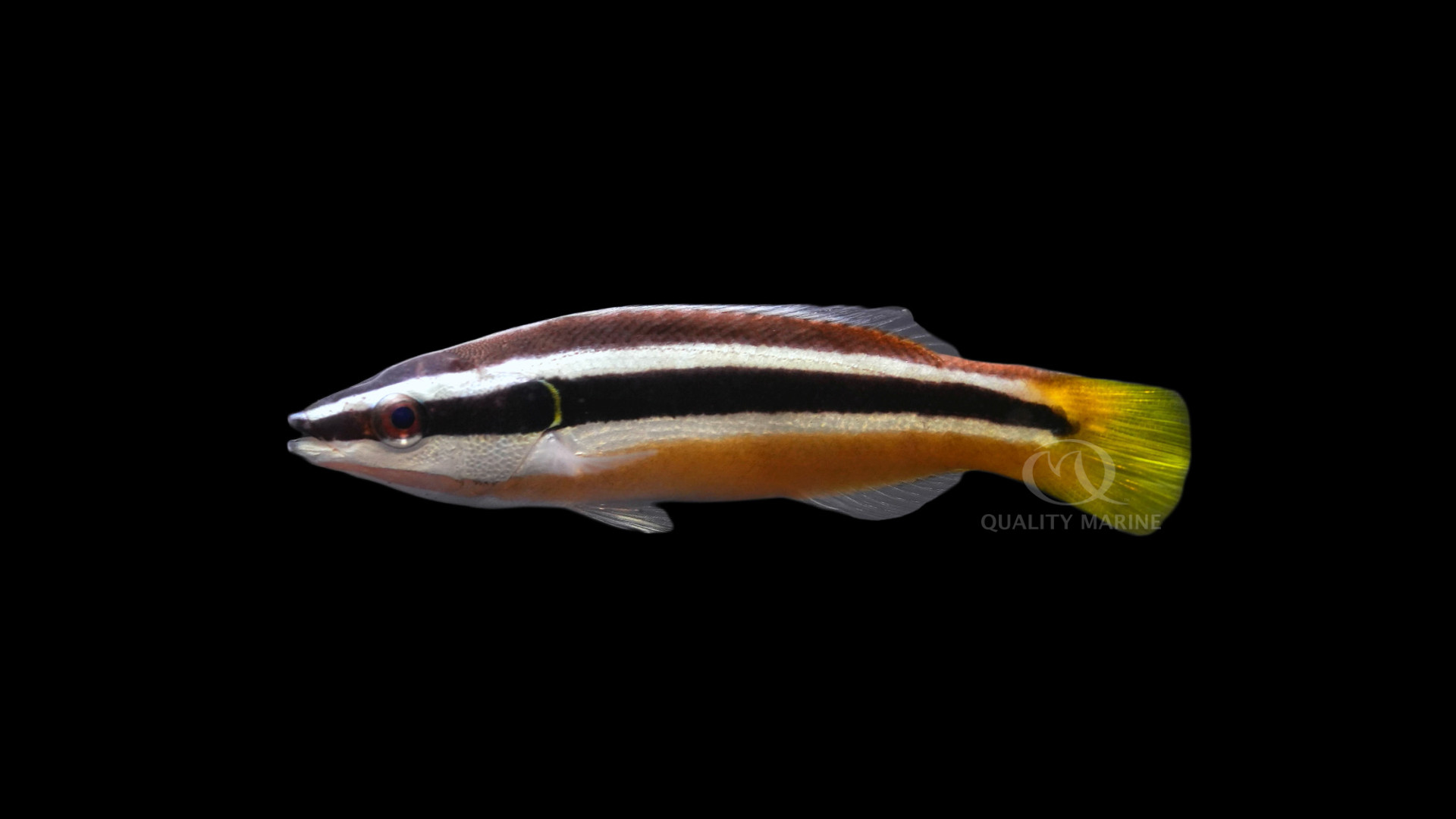Jewel Like Juliis

The fish we usually call the “Julii Cleaner Wrasse” here in North America has a few other common names worldwide like “Yellowband Tubelip,” which makes sense when you see the adult coloration and exaggerated lips. The “Yellow Tail Wrasse,” which is unimaginative, but also accurate for both the adult and transitional fish. Another staff favorite is “Wandering Wrasse” which references the fun-to-watch swimming style this wrasse has. We've seen it retailed as a “Cigar Wrasse” as well, but that name is more commonly applied to a couple other wrasses. Whatever you like to call it, Diproctacanthus xanthurus is a small fish, getting only three or four inches long; they are much more commonly available at two inches and under, when they more frequently still have their juvenile coloration.
In the wild, they are found both singly and in small groups and they form distinct pairs for mating. Their habitats are usually coral rich and protected. Juliis live in fairly shallow water, generally less than 50 or 60 feet. They range throughout the Indo-Pacific where they are a very common fish. While they do sometimes form groups in the wild, we recommend keeping them as a single in all but the biggest aquariums. They could be territorial with other fish that are similar. That being said, they will do well with a large variety of other fish, being both peaceful in nature and adept swimmers that hide well at night and so unlikely to be food for all but the most effective predator fish.
Juvenile Diproctacanthus xanthurus are excellent cleaner fish, generally removing external parasites from smaller fish on the reef. As the fish ages, this behavior will fade away, and in the wild, they will mostly consume coral polyps in adulthood, a behavior that will (unfortunately) also occur in the home aquarium. While the Julii is an easy fish to feed (unlike most corallivores) it will also consume a wide variety of coral polyps, including zoanthids, small polyp stony corals, even some LPS corals. As of the writing of this article, we have not yet found a coral type they are “safe” with. For this reason, we cannot recommend putting them in reef aquaria. We do recommend putting a Julii in pretty much every other aquarium! We've found that in aquariums that lack coral food, they're much more likely to continue to function as a cleaner wrasse later into their development.
This is an easy to keep, very active, engaging little fish, that as we referenced before, will usually accept common aquarium foods easily. We feed them a meaty mix of thawed foods like mysis shrimp and finely chopped seafoods, which they do very well on. They will also accept pelletized foods in short order.
In regard to housing the Julii Wrasse, they don't require a huge tank, and one would be fine in an aquarium as small as 40 gallons, or as big of a display as you choose. They are powerful swimmers and will do better in aquariums that have a prodigious amount of flow. The more rocks the better as they will utilize any gap to swim in and out of. Like many other wrasses, the Julie Wrasse will need some sand to hide / rest under, which should be not so fine that it gets blasted around by the flow, but not so course that the wrasse gets scratched up by it. Any glass box you choose should be covered as Diproctacanthus xanthurus are excellent jumpers. As far as other aquarium parameters go, they are fine in the normal range of salinity common in the hobby (1.019 – 1.026) as well as temperatures (mid to high 70s) and pH range (7.5-8.2). They are not overly sensitive to nitrate levels.
As long as you don't have a reef aquarium, the Julii Cleaner Wrasse has our highest recommendation. They are unique in that they have success rates vastly higher than most other cleaner fish, as well as most other “corallivores.” They are fun to watch, engaging and pretty little fish well suited to aquarium life. If this sounds like a fish you'd be interested in, head over to your Local Fish Store and ask them for a sustainably harvest Julii Cleaner Wrasse from Quality Marine today!